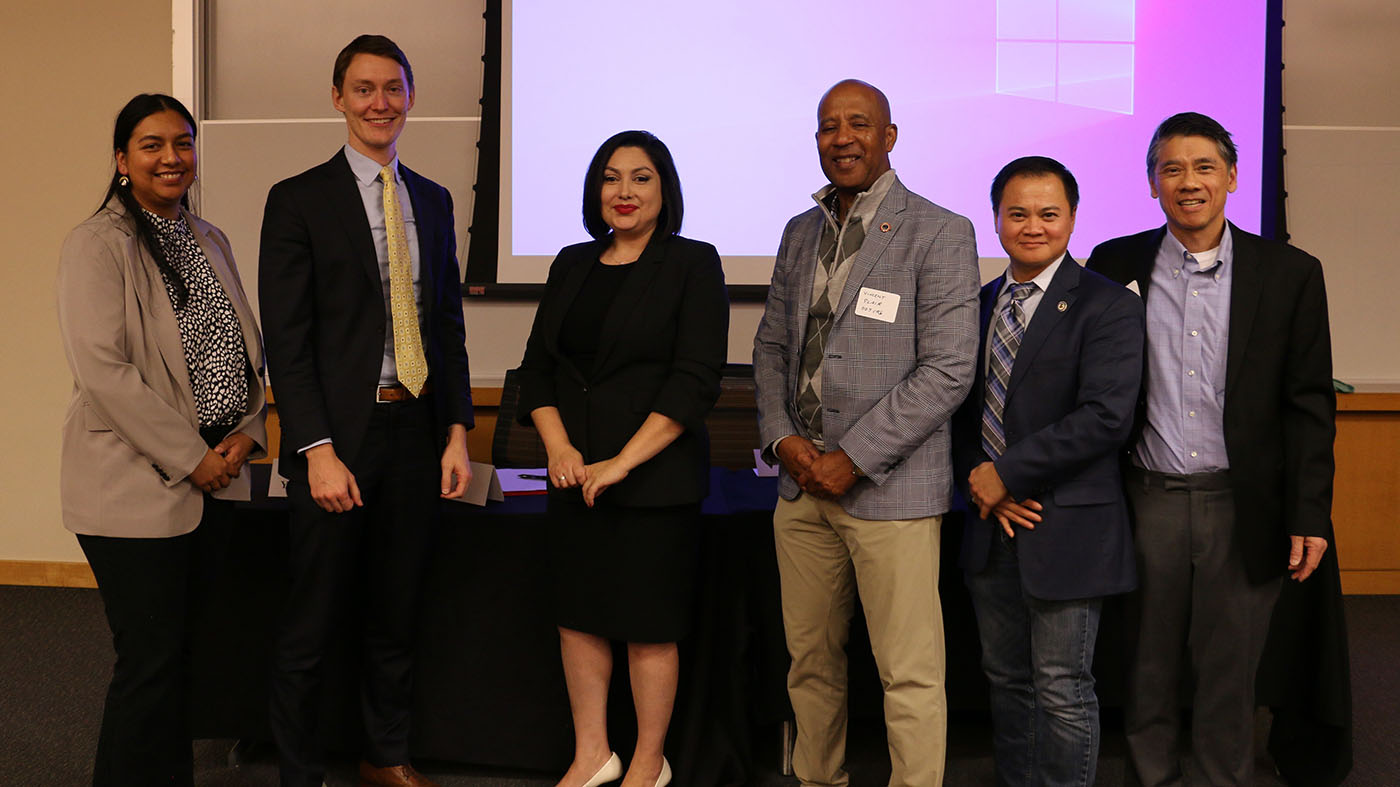Hate crimes against marginalized populations often make the news, but many people may not be familiar with properly identifying hate crimes. To aid in this process and encourage more reporting, Seattle University School of Law hosted a Hate Crimes Overview on Thursday evening, where representatives from the King County Prosecuting Attorney’s Office and the U.S. Department of Justice/FBI shared their knowledge with students, faculty, staff, and community members.
Five speakers participated in the event, including: Seattle U Law Adjunct Professor Christopher Koa; Yessenia Manzo '19, the King County Prosecuting Attorney’s Office’s (KCPAO) deputy prosecuting attorney for hate crimes; William Dreher, a criminal civil rights attorney for the U.S. Attorney’s Office for the Western District of Washington; Vincent Plair, regional director of the U.S. Dept. of Justice's (DOJ) Community Relations Service for the Rocky Mountain, Western, and Northwestern regions; Knight Sor, a conciliation specialist for the DOJ’s Community Relations Service; and Emily Navarro Williams, a hate crimes and vulnerable populations victim advocate at the KCPAO.
In his introduction, Koa related how his family’s home was broken into over the summer following a string of burglaries targeting Asian American households in Seattle. Similar crime sprees against Asian Americans have been reported across the country. Koa explained that stereotypes against Asian Americans include the belief that they keep valuables in their houses.
Manzo gave a definition of hate crimes, explaining that it can often be difficult to differentiate between a hate crime and a bias incident, as both can be malicious, bigoted, and traumatizing. However, while bias incidents can include behaviors that are hateful, these acts do not break any laws. Examples can include yelling racial epithets, handing out racist flyers, or displaying hateful materials on private property.
“A bias incident is an act of prejudice with no underlying criminal behavior,” Manzo explained.
In contrast, a hate crime is when a person maliciously and intentionally commits a crime — causing physical injury, damaging property, or threatening a group or its members — because of their perception of the victim’s race, religion, sexual orientation, or disability.
“When a hate crime happens to an individual, it affects an entire community,” Manzo said. “You can feel that ripple effect whether it’s local, national, or international.”
There have been more than 300 hate crime cases filed in King County in the past five years. A majority of those, 56%, were race-related; of these, more than half were anti-Black, with Asian Americans being the second-highest targeted group. Anti-sexual orientation hate crimes were the second-most common type of hate crime at 16%, followed by anti-religion crimes at 3%.
While there have likely been far more hate crimes that have occurred in King County in those years, Manzo said that many hate crimes go unreported. This is due to a variety of reasons, such as victims not realizing that what happened to them constituted a crime, fearing that they will be deported if they speak to police, or not wanting to relive the trauma by pressing charges.
Even when hate crime charges are filed, obtaining a conviction is rarely straightforward. Manzo explained that many hate crimes tend to be mixed-motive, meaning that prejudice against a group was not the perpetrator’s only motivation for committing the crime. For example, a domestic violence-related hate crime could include romantic jealousy as a second motive. She added that it can be difficult to prove a person’s intention, and that some hate crimes include certain nuances, such as a member of one marginalized group committing a crime against another member of a different marginalized group.
Judges may also be hesitant to label a defendant as racist, homophobic, or sexist. However, Manzo noted that the prosecution does not have to prove the defendant is racist or hates a certain group but was simply in this instance behaving in this way because of their perception of the victim’s identity.
The panelists all emphasized that even if a person believes that an act committed against them was a bias incident rather than a hate crime, it is still important to report the act so that it is documented. Dreher said that this information “is important to report and document” because it could help prosecutors prove motive if the perpetrator later commits an actual crime against a group or individual.
The event was organized by Seattle U Law Diversity, Equity, and Inclusion, and the Seattle U Law Asian, Filipino, and Middle Eastern and South Asian Law Students Associations. Other sponsors included: Asian Counseling and Referral Service; Chinese Information and Service Center; Filipino Lawyers of Washington; Asian Bar Association of Washington; the University of Washington Asian Pacific American Law Students Association; the National Asian Pacific American Bar Association; the Organization of Chinese Americans; and the National Asian Pacific American Law Student Association.

